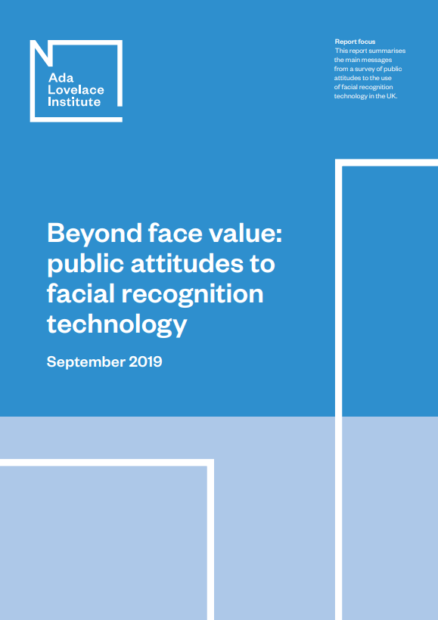What do or don’t we know about public attitudes to data policy?
Discussion at a virtual roundtable in March 2022

The discussions from this roundtable were informed by a draft evidence review on public attitudes to regulation.
Background
In Ada’s work relating to the data policy landscape (such as the Government’s ‘Data: A New Direction’ consultation or the National Data Strategy), we’ve found both a need for and a welcome interest in UK public attitudes towards data from policymakers, regulators and other officials. This is with good reason. Aligning the UK’s data regulatory ecosystem to public attitudes, societal values and people’s expectations will be crucial to ensuring public trust and support.
But data is a broad topic, public views towards it are nuanced and complex, and research on public attitudes doesn’t always straightforwardly translate into policy.
To address this challenge and support policymakers to be informed by a deep understanding of public attitudes towards data, the Ada Lovelace Institute curated a review of evidence of public attitudes to data, drawing on around 40 studies conducted in the UK in recent years.
A draft of this evidence review served as the basis for a virtual roundtable held on 31 March 2022, convening a cross section of academia, policy and civil society to discuss public attitudes towards the regulation of data in the UK.
The evidence review aimed to synthesise findings from the existing research landscape. Fortunately, excellent work in understanding UK public perspectives to data already exists, from academic research like the Living With Data project, to consumer research conducted by groups like Which?, to Government research like the Centre for Data Ethics and Innovation (CDEI)’s excellent tracker survey or the Geospatial Commission’s Location Data Dialogue. Public engagement participatory research is also a core component of our work at Ada.
The roundtable drew from this to address three questions: What do we know about public attitudes towards data regulation? What don’t we know? And, how can we find out?
The roundtable began with presentations from researchers and organisations currently conducting public attitudes research. These were followed by discussion among all the attendees.
Speakers
-
Katie Alpin
Which? -
Shayda Kashef
Administrative Data Research UK -
Holly Clarke
CDEI -
Professor Helen Kennedy
University of Sheffield
What do or don’t we know about public attitudes to data?
Context matters
In her presentation, Professor Kennedy described context as the ‘defining factor’ in determining people’s attitudes to data and in how we make sense of those attitudes. Both her research and the recent survey findings published by the CDEI, for example, find that people trust the NHS with data far more than they trust social media companies. This is echoed in several other studies, too, and was first reported by the Royal Statistical Society and Ipsos MORI in 2014 as the ‘data trust deficit’. These findings show that how people trust the use of data depends strongly on the context: who is using the data and how are they using it?
In discussion roundtable attendees noted how the type of data and purposes of data use matter, too. People feel differently about identifiable financial data versus anonymised location data, and data used for medical research will garner more public support than data used for targeted advertising.
The issue of context in relation to attitudes to data is not entirely novel, but it does generate multiple complexities for policymaking and regulation that are yet to be addressed. Roundtable attendees recognised that common ideas that reference data with a broad brush – ‘data can benefit society’ or ‘people are concerned about data privacy’ – are not specific enough to be meaningful, and the different contexts of data must be disaggregated to be made sense of.
This is especially important for policymaking and regulation, as any attempts to legislate around ‘data’ will likely miss the contextual nuances that would make legislation effective and garner public support. Instead, policy must encourage and support organisations to navigate their data responsibilities in their specific contexts.
Who are ‘the public’?
Roundtable attendees noted that there is no such thing as one homogenous public, and different communities are affected differently by data due to the uneven way that its benefits and harms are distributed across society.
National surveys report attitudes according to social demographics – age, gender, economic status etc. – and national dialogues try to reflect the broad diversity of society, but such studies struggle to centre the specific communities most affected by particular uses and kinds of data, and therefore, it can be difficult to understand their experiences. But conversely, while studies that centre the experiences of specific groups and communities are vital, a single study alone cannot paint the whole picture of society.
From this dilemma, discussion turned to the need for more research, dialogue and deliberation with specific groups identified as experiencing disproportionate benefit or harm – to accompany broad, nationally representative studies and studies. Conducting both types of research and sharing findings across them will be crucial to building a fuller and deeper picture of people’s attitudes to and experiences of data.
Awareness is not equivalent to trust or support
Roundtable attendees reflected on the understandable interest from Government bodies and data innovators in increasing public awareness of data uses, particularly around the ways those uses can benefit society and what measures there are to protect individuals’ data rights. However, our evidence review found that the relationship between public understanding and public support is not straightforward, and simply raising awareness is unlikely to increase support and acceptance.
Roundtable attendees suggested that while there is broad awareness of the growing datafication of everyday life and society, meaningful public understanding or detailed awareness of specific instances of data use is limited. This is where increased transparency around data uses has the potential to support public awareness, knowledge and understanding.
Importantly however, the roundtable attendees noted how awareness and understanding are linked but distinct concepts. Awareness may simply be a recognition that data is collected and used across all aspects of society, whereas understanding could imply a deeper knowledge about the details of data use, which is the basis for navigating the digital world and enacting one’s digital rights. All too often these concepts are merged, ignoring the fact that raising awareness through transparency is not the same as fostering understanding. Instead, increased transparency should be aimed at meeting this higher standard of increased understanding.
Understanding and awareness are each intertwined with issues like socio-economic diversity, public trust, and digital literacy or access. These are complex relationships and little work has yet to meaningfully make sense of the relationship between understanding and trust, or awareness and understanding in a way that is useful for policymakers.
Putting public voice into data policy
Deepening the research and building the evidence-base for policymaking
The roundtable discussion raised several areas where future research should focus, and considerations that should be borne in mind by those who do research and those who interpret it. These include:
- understanding the complex relationship between public trust and public awareness,
- building a clearer picture of what people think constitutes ‘the public good’ or ‘public benefit’ when it comes to data, as these were terms roundtable attendees felt were too often used and too little understood,
- exploring the connections between people’s attitudes and their behaviours when it comes to data, building more on concepts like or coerced participation,
- finding ways to let people express their aspirations for the future of data and data-driven technology.
Importantly, as highlighted in the roundtable discussions, it is not enough to continue asking research questions without addressing the importance of context. Existing research offers us a good baseline and shows us clearly that public attitudes are dependent on the who, what, why, where and when of data use. But in an increasingly data-driven and datafied world, it may no longer be fruitful to study public attitudes to ‘data’ in general.
Instead, we need research projects that consider specific contexts of data use, either by designing studies around a single domain (such as health or finance) or by designing studies that ask about specific types of data, purposes for which data is collected and used, the different organisations that might be involved in processing it, or the different communities that are affected by it. And where understandings of attitudes towards data more broadly are needed, this can be drawn by synthesising across several context-based studies.
Finally, we need more work that accounts for the heterogeneity of ‘the public.’ Studies must work to – for example – understand how Black British people feel about the use of data, how disabled people experience data-driven systems, or how inner-city working-class communities might be excluded or disadvantaged by the rising reliance on data-based decision-making systems. To do this, we must be creative and open-minded about what public engagement and attitudes research can or should look like and involve people in co-designing the processes of participation.
Bridging the gap between public voice and data policy
Attendees recognised how the vast array of public attitudes research and public dialogue that already exists does not always translate into policy evidence or action effectively.
There are, however, some growing attempts to change this, including from Government bodies like the Geospatial Commission and the CDEI, who are conducting attitudes and engagement work in direct relation to policymaking initiatives. And there are some positive local government initiatives too, like the Camden Council data charter, co-developed with residents.
But individual and one-off projects can rarely be comprehensive, and often do not directly translate to other domains or contexts. The enormous scale of ‘data’ as a topic, the effects of context on public attitudes and the complex nuances of people’s perspectives requires a diverse array of research and evidence to unpack. This makes it tough for policymakers to keep up with a comprehensive understanding of research landscape alongside the other pressures on their time.
Wrapping up the discussion: what next?
Data cuts across all domains, topics and issues in multifaceted ways. This makes it hard for policymakers to make sense of how to regulate it. But more context-specific, community-focused public attitudes and dialogue research that builds on our existing research foundations will be a powerful aid in addressing this challenge.
From the roundtable, we have identified three clear actions for the research and policy community:
- Convene the public attitudes to data research landscape. Great work is happening in this field, and policymakers are keen to engage with it. But the scale and complexity of the topic are significant, and there are multiple demands on researchers’ and policymakers’ time. Efforts to map-out this landscape, and bolster connections and coordination within it would go a long way to supporting data policy that is informed by public voice.
- Synthesise research findings for specific policy issues. It is not always easy to align research projects with the needs of policymakers; academic and Government priorities move in different ways. Even where this is done well, such as by the CDEI or by civil society and policy researchers, it can be challenging for wider research findings to be applied to specific contexts, or for others to make use of research that is tied to one narrow policy area. Work to review and synthesise research from a broad field and translate it to specific policy topics – like POSTNotes – can be of great value. It is in this spirit that we conducted our evidence review.
- Conduct more research and dialogue that is directly tied to policymaking. It is clear that in-depth, context specific public attitudes and engagement research that is relevant to ongoing policymaking activities is invaluable in putting public voice at the heart of data regulation. As the UK Government renews the data regulation ecosystem, further dialogue with members of the public from across the country will be essential. But this work must be meaningful, not a tick-box exercise, and it must be driven by the public’s priorities as well as those of other stakeholders.
We at Ada intend to continue to work across all three of these actions, and are keen to work with partners, particularly on actions one and three.
If you’d like to be a part of this work in some way and we aren’t already in touch, contact Aidan Peppin apeppin@adalovelaceinstitute.org.
Acknowledgements and links
We’re grateful to all our roundtable attendees, including:
Stephen Almond, Information Commissioner’s Office
Katie Alpin, Which?
Theo Bass, UKRI Sciencewise
Carl Beesley, National Data Guardian
Dr Grant Blank, Oxford Internet Institute, University of Oxford
Holly Clarke, Centre for Data Ethics and Innovation
Matt Davies, Open Data Institute
Natalia Domagala, Central Data and Digital Office, Cabinet Office
Professor Todd K. Hartman, University of Manchester
Shayda Kashef, Administrative Data Research UK
Emily Keaney, Information Commissioner’s Office
Professor Helen Kennedy, University of Sheffield
Dr Bran Knowles, University of Lancaster
Natalie Mawhinney, Ofcom
Dr Trupti Patel, Imperial College London
Jeni Tennison, Connected by Data
Alexandra Wakefield, The Royal Society
And many others who preferred to remain anonymous.
You can find out more about the presenters’ work via the following links:
Professor Helen Kennedy, Living With Data
Image credit: Orbon Alija
Related content

The Citizens’ Biometrics Council
Report with recommendations and findings of a public deliberation on biometrics technology, policy and governance

Who cares what the public think?
UK public attitudes to regulating data and data-driven technologies

Beyond face value: public attitudes to facial recognition technology
First survey of public opinion on the use of facial recognition technology reveals the majority of people in the UK want restrictions on its use